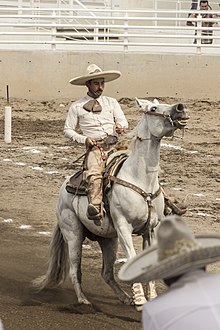This article includes a list of general references, but it lacks sufficient corresponding inline citations. (March 2010) |



Charro, in Mexico, is historically the horseman from the countryside, the Ranchero, who lived and worked in the haciendas and performed all his tasks on horseback, working mainly as vaqueros and caporales, among other jobs.[1] He was renowned for his superb horsemanship, for his skill in handling the lasso, and for his unique costume designed specially for horseback riding. Today, this name is given to someone who practices charreada (similar to a rodeo), considered the national sport of Mexico which maintains traditional rules and regulations in effect from colonial times up to the Mexican Revolution.[2]
- ^ Pérez Benavides, Amada Carolina (2007). "Actores, Escenarios y Relaciones Sociales en Tres Publicaciones Periódicas Mexicanas de Mediados del Siglo XIX". Historia Mexicana (in Spanish). 56 (4). El Colegio de México: 1189. Retrieved 16 June 2024.
- ^ "REGLAMENTO GENERAL DE COMPETENCIAS" (PDF). Archived from the original (PDF) on 2010-11-20. Retrieved 2016-05-11.